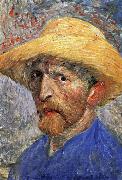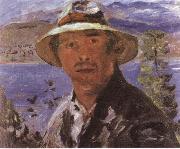Wholesale Oil Painting Reproductions No Minimum and Door to Door! |
|||||||||||
|
|
|||||||||||

|
|||||||||||
|
|
|
||||||||
All Vincent Van Gogh Oil Paintings |
||||||||
|
|
||||||||
|
|
||||||||
|
Artist Introduction: Dutch Post-Impressionist Painter, 1853-1890
Vincent Willem van Gogh (30 March 1853 ?C 29 July 1890) was a Dutch Post-Impressionist artist. Some of his paintings are now among the world's best known, most popular and expensive works of art.
Van Gogh spent his early adult life working for a firm of art dealers. After a brief spell as a teacher, he became a missionary worker in a very poor mining region. He did not embark upon a career as an artist until 1880. Initially, Van Gogh worked only with sombre colours, until he encountered Impressionism and Neo-Impressionism in Paris. He incorporated their brighter colours and style of painting into a uniquely recognizable style, which was fully developed during the time he spent at Arles, France. He produced more than 2,000 works, including around 900 paintings and 1,100 drawings and sketches, during the last ten years of his life. Most of his best-known works were produced in the final two years of his life, during which time he cut off part of his left ear following a breakdown in his friendship with Paul Gauguin. After this he suffered recurrent bouts of mental illness, which led to his suicide.
The central figure in Van Gogh's life was his brother Theo, who continually and selflessly provided financial support. Their lifelong friendship is documented in numerous letters they exchanged from August 1872 onwards. Van Gogh is a pioneer of what came to be known as Expressionism. He had an enormous influence on 20th century art, especially on the Fauves and German Expressionists. |
||||||||
|
|
||||||||
|
Self-Portrait in a Straw Hat Painting ID:: 27070 |
mk52
1887
Oil on canvas
34x26.7cm
Detroit Institute of Arts |
|||||||
Height Width |
INS/CM Quality |
|||||||
|
X |
| |||||||
|
|
||||||||
All Lovis Corinth Oil Paintings |
||||||||
|
|
||||||||
|
|
||||||||
|
Artist Introduction: German Painter, 1858-1925
German painter and writer. He grew up on his family's farm and tannery. As a child he showed interest in art, taking informal lessons in drawing from a local carpenter and caricaturing his primary school teachers. Corinth's father sent him to secondary school in the nearby city of K?nigsberg (now Kaliningrad), where he lived with his widowed aunt. A superstitious woman fond of story-telling, she possessed what Corinth later described as a coarse temperament and an unrestrained, 'demonic' humour. These qualities and his aunt's bohemian acquaintances, including fortune-tellers and soothsayers, fascinated the young Corinth, accustomed to his more reserved parents. |
||||||||
|
|
||||||||
|
|
Self-Portrait in a Straw Hat Painting ID:: 54333 |
mk235
1923
Oil on canvas
|
||||||
Height Width |
INS/CM Quality |
|||||||
|
X |
| |||||||
|
|
||||||||
|
Prev Next
|
||||||||
|
|
||||||||
|
Related Paintings to Lovis Corinth :. |
||||||||
|
|
||||||||
|
CONTACT US |


